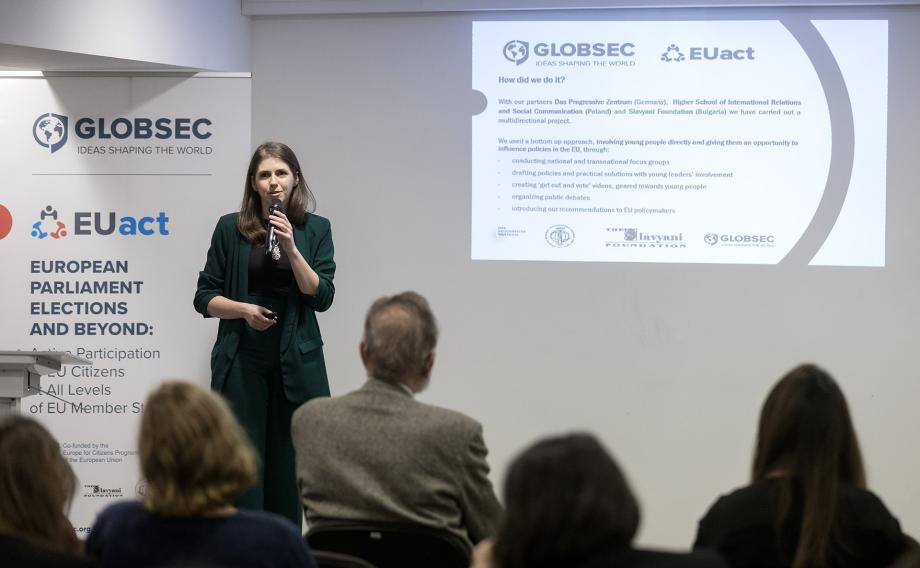‘One election does not a make a European citizen’ – Key lessons learnt from the EUact project

When I took over the EUact project in June 2019, Europe was still being blown away by its own great sigh of relief that the Eurosceptic forces did not gain as much ground as they could have done in the 2019 European Parliament elections. As I continued to implement activities and analyse data on what young people across Europe think and expect from the EU during in the second half of 2019, I realised that whilst the elections were an important battle to be won, we may yet lose the war with Eurosceptic voices and attitudes across Europe. Here are the four key lessons I have learnt about Euroscepticism among the young, and citizens’ participation, especially in Central and Eastern Europe, from the project.
Euroscepticism is an ‘above and beyond’ problem
Perhaps an obvious point to some, two reflections are nonetheless worth making here. First of all, beyond the (rightfully) much-lauded fact that the turnout was the highest in 20 years, lies the much less laudable fact that citizens’ participation in the elections still remains low, especially in some of the partner countries of this project. Though Germany has done very well with a turnout of 61% (up from 48% in 2014) and Poland’s participation too has practically doubled from 24% to 46%, in Bulgaria participation actually went down from 36% to 33%. Slovakia’s participation has risen from 13% to 23%, but it nonetheless remains the country with the lowest turnout in the EU. Three quarters of the arguably most EU-integrated V4 country not being engaged with the EU affairs, not enough to participate even if just by an act of voting, is a serious issue. Though the people that did vote mostly chose reasonable over anti-systemic voices, it is the voices of those that chose not to choose their European future that matter and need to be listened to more. The perception of the EU goes ‘beyond’ the ‘Brussels bubble’– EU as an institution, but also as a value system is embedded into the everyday lives of its citizens, and it is there where most impact and difference could be made, by national and EU politicians alike.
Secondly, the concerns of the EU citizens seem to go ‘above’ the election cycle – this struck me when I was evaluating the results of the two transnational reflection group meetings. The first one took place 6 months before the EP elections, in November 2018, the second one took place just after the new EU Commission had been formed, in September 2019. Though some issues (such as climate change) rose to prominence whereas others lost their edge slightly (including migration), the ideas of young people as to what the EU should do were practically the same, and they were not, on the whole, anything completely new either. The fact that the East-West divide remains a prominent issue is especially worth noting. Taking care of the long-term structural EU problems, especially when it comes to greater convergence across the Union remains a key concern.
Methodology matters
As part of my work on the project, I discussed with other experts on this subject the different ways to engage citizens in conversation and their experience corresponded with that of our project – there are different methodologies that work with different groups of the population, but it is making sure that the methodology is clear from the start and that there is a transparent process and a tangible outcome that matters the most to citizens’ decision whether to get involved. When running the Transnational Reflection Groups, making it clear that the conclusions are to be presented to EU policymakers (rather than to the general public for example) certainly had a positive impact on the quality of the outcomes – it focused the participants and encouraged them to think in concrete rather than general terms. Even more important is the need to give citizens the feeling that their voice matters, and that their recommendations will be used to contribute towards change – if this is not felt, every next exercise in citizens’ participation merely decreases the will of the citizens to get engaged at all. Finally, having enough time to not only analyse the problems, but to also come up with in-depth solutions is a detail not to be overlooked, as almost all of the transnational reflection group feedback forms made clear.
Diversity and multicultural dialogue are not a nice bonus, but an absolute must
The level of diversity (which was set rather high to begin with) is one of the greatest, most vital achievements of the project, despite the fact that some participants asked for yet more diverse voices to be present in such activities in the future! The project involved hundreds of people directly and reached hundreds of thousands indirectly, from more than 15 nationalities across 4 countries. No event apart from where it was desirable (focus groups for example) was homogenous in terms of nationality, yet materials were also available in local languages. This allowed for a complex, multidimensional approach towards EU citizenship; a genuine multicultural dialogue and understanding of the different attitudes towards the EU in our experience was the only way to achieve the project’s ultimate goal – to increase ownership of the European project. The gender balance too was of primary importance; the final event involved an all-female roundtable of top experts in the field of citizens‘ participation. Certain provisions must be made for this to work even more effectively, however – providing translation for example would help greatly to engage certain participants who did not feel comfortable sharing their views due to the language barrier.
Communication is key
If I was to choose just one takeaway from this project, it would certainly be this – what and how the EU communicates with its citizens matters more than anything. This point was emphasized by young people in the national focus groups and transnational reflection groups, as well as by experts in our public events and the closing event. Two things matter – what the EU communicates, and how. The need to make it clear what the EU does for its citizens, and how and why they can contribute to building the Union is paramount to not let the discourse about the EU be hijacked by Eurosceptic, nationalist forces. If there are benefits to be gained and ways to get involved, but citizens do not know about them, their perception of EU that equals faraway Brussels bubble will not disappear. The projects’ activities also made it clear that audiovisual materials and social media campaigns win over traditional methods of engagement (websites and informational leaflets for example), though personal engagement and honest discussions with political leaders should not be underestimated either
Zuzana Podracká, PhD. is a Research Fellow at the Future of Europe Programme at GLOBSEC Policy Institute and EUact project coordinator.
The European Commission support for this article does not constitute an endorsement of the contents which reflects the views only of the author, and the Commission cannot be held responsible for any use which may be made of the information contained therein.

